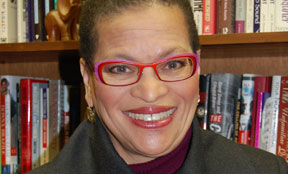
Shackled for Praying
By Julianne Malveaux (NNPANewswire Columnist)
Faith and prayer have been the backbone of the African American community since we came upon these shores. We have counted on our faith leaders (the roll call would include Revs. Richard Allen, Absalom Jones, James Walker Hood, Martin Luther King, Jr., Wyatt Tee Walker, Jesse L. Jackson, William Barber, Vashti McKenzie, Barbara Williams Skinner and many others) to articulate the justness of our cause and to mobilize us to work for the justice that is called for in the New Testament, especially in Matthew 25: 35-45. Our ministers are revered leaders who often stand in the face of injustice. We are not surprised, and indeed, encouraged, when their firm stands in the face of oppression lead to collisions with the law. Still, when faith leaders are treated harshly, it forces us to examine the injustice in our system. When Dr. Martin Luther King, Jr. wrote the “Letter from the Birmingham Jail” in 1963, he chided White ministers who made a public statement about his methods, suggesting that segregation should be fought in the courts, not in the streets.
His letter moved the White faith community to confront some of the injustices of segregation and to form alliances with the Civil Rights movement.
King spent eleven days in the Birmingham jail in extremely harsh conditions. However, the oppressor does not learn from its excesses. On June 12, nine faith leaders were shackled and held for 27 hours after being arrested for praying at the Supreme Court. The multicultural group of men and women are part of Rev. William Barber’s Poor People’s Campaign ( A National Call for Moral Revival). Their effort is to bring attention to the amazing inequality and moral bankruptcy of our nation. Their prayers at the Supreme Court were extremely timely given the court’s recent actions to make it more difficult for people to vote in Ohio, and given the injustices, this court continues to perpetuate.
Like Dr. King, the nine who were arrested—Poor People’s Campaign co-chair the Rev. Liz Theoharis, D.C. clergy the Revs. Jimmie Hawkins, Graylan Hagler and William Lamar IV, and the Revs. Rob and Hershey Stephens from the Fort Washington Collegiate Church in New York City)—were subjected to extremely harsh conditions. No threat to anyone, they were shackled, placed in handcuffs and leg irons, confined to roach-infested cells with nothing to rest their heads on, but a metal slab. This is the 21st century, but you wouldn’t know it by the way these clergies were treated. Yet, their actions and those of the Poor People’s Campaign are writing the contemporary letter from the Birmingham jail. Their brief incarceration, in the name of justice, is part of a larger movement to bring attention to increasing poverty and injustice, even in the face of economic expansion. Like Dr. King’s Poor People’s campaign, this 21st century Poor People’s Campaign, launched fifty years later, is an attack on poverty, racism, and militarism, and also ecological devastation and our nation’s “moral devastation.”
At the 2018 Rainbow PUSH International convention on June 15, Rev. Barber railed against interlocking injustices that did not begin with our 45th President, but have been exacerbated by the depravity he represents. In a rousing address that wove humor, statistics, public analysis and a scathing attack on our nation’s immorality, Barber argued that “the rejected,” which may comprise more than half of our nation, will lead to the revival of our nation.
Who would have thought that nine faith leaders would be among the rejected? Who would have thought that Dr. King would have been? But Dr. King eagerly embraced the status of “rejected.” He once preached, “I choose to identify with the underprivileged. I choose to identify with the poor. I choose to give my life for the hungry. I choose to give my life for those who have been left out of the sunlight of opportunity.” Rev. Liz Theoharis told Democracy Now’s Amy Goodman that the conditions she and fellow clergy experienced, while uncomfortable, were the same conditions poor inmates experienced. That’s the power, in some ways, of the Poor People’s Campaign. Clergy and others are forcing the issue, lifting their voices, making connections, claiming the discomfort and pain of the rejected, embracing the fact that they, too, are among the rejected.
To shackle clergy simply for praying is to exhibit a peculiar form of cruelty and inhumanity. Shackling is reminiscent of enslavement; shackling is a method of humiliation; shackling is an attempt to use the harsh lash of unjust law on the backs of those who pray for just law. Rev. William Lamar IV, who has been arrested on three consecutive Mondays for protest action said that the June 12 arrests and treatment were the harshest, he has yet experienced. In Washington, D.C., people who are arrested for protesting are usually given a ticket that requires a court appearance and a likely fine. What did the shackling say about the hallowed sacredness of the “Supreme” Court?
Shackling clergy for praying is like condemning the Sun for shining. Unjust law enforcement can shackle arms and legs, but not movements. Harsh treatment of leaders in the Poor People’s Champaign only strengthens resistance against injustice, racism, poverty, and ecological devastation.


Be the first to comment